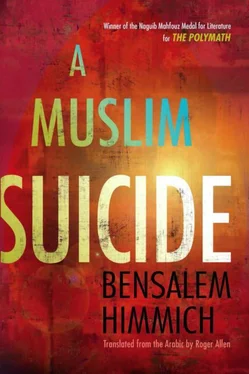A student in the very back row spoke up. "My name is Zayd al-Masmudi," he said in an angry tone, "and I'm almost thirty. Everything the master has told us about the obligations found in the Qur'an has helped me a lot, but my problem is one that also affects others like me. It's not a case of whether one wife is better than more than one, but simply the fact that I can't find even half a wife. As the saying puts it, master, `the eye may be able to see, but the hand is weak.' There is no way for someone like me who has exhausted all his resources and is trapped in the vice of unemployment to fulfill the obligations of marriage."
"Dear brother," I said in response not only to this anxious student with all his problems, but also to others like him, "unemployment is indeed a genuine curse on the nobility of mankind, a dagger-thrust aimed at the innate desire for knowledge and learning. Its harmful effects are felt in both present and future. But we're a group of people who try to ward off its harmful effects by helping each other and making an effort to find a decent job. When it comes to making a good-faith effort to get married, no one will fail if we are willing to offer our help. God's hand is with the community. So get to work and cooperate with each other so that you can grow in God's eyes."
Another student had a question. "What does our teacher advise," he asked, "when someone needs to get married or do something else, but he can't find anyone to offer him assistance or make him a loan without interest? Is he supposed to remain deprived till he grows old and decrepit, or should he bow to necessity even though it involves usury?"
I said nothing for a while since I wanted the students to listen carefully to what I was going to say.
"The Qur'anic verse dealing with usury is a late one," I went on. "`Umar ibn al-Khattab regretted the fact that the Prophet did not have enough time to clarify and explain it. My personal view on the subject is that it all depends on the price situation, living costs, and the value of money. If the total amount involved between the time of taking the loan and repayment remains constant, then the profits involved are indeed usury as defined by the text. If on the other hand the funds involved suffer change or loss, then the value added to the loan is considered compensation for the loss and any damage that might have been incurred. Just imagine, my brother, that you loaned someone else a large amount of money and reclaimed it after a number of years. You then find that the amount no longer covers the expenses that would have been incurred before. What are you supposed to do in such a case?"
The student remained silent and stared pensively at the ground. Another student now asked me about the ultimate sanction of cutting off the hand of a robber, male or female, and the requirements involved in carrying out such a sentence, whatever the case and time period involved.
"There is only a single verse on that subject, and it comes in the Sura of the Table. Its purpose was a general one, to scare people. As a result, when it comes to specifics and consideration of particular circumstances, two principles have to be taken into consideration: the first involves the need to avoid resorting to these ultimate sanctions on the basis of doubts concerning the case itself. As Muhammad himself-peace and blessings upon him! — says, `As far as possible, avoid applying the sanctions on Muslims. If you can find a means of avoiding them, then allow them to go free. It is far better for an imam to make a mistake by forgiving someone than to do so in his punishment.' The identification of that avoidance mechanism-following the pattern of conduct of `Umar, the caliph known as the `arbiter' (God be pleased with him!)-is an obligation on all judges who exercise their discretion in legal matters and rulers in difficult times such as those in which we ourselves are now living. The most significant of those difficulties are hunger, need, and poverty. As the proverb puts it, `Poverty is akin to disbelief.' `What amazes me about someone with no food in his house,' says Abu Dharr al-Ghifari,* `is that he doesn't go out in public with his sword drawn.' The second of these principles requires that the facts concerning the crime of theft be contextualized in terms of removal of the conditions that cause the thief to steal in the first place. Cutting off the limbs of thieves and making them an example to others is not the answer. Even when this ultimate sanction is applied, it is still not a sufficient deterrent when it comes to putting a stop to theft. In summary then, the proper thing to do is to find a way of dealing with the root causes of this severe problem and determining what are the appropriate reformatory or incarceration penalties in accordance with circumstances and possibilities. God alone can guide us to the correct answer!"
Another student now asked if it were required to apply Shari'a law to a recusant, whether it involve repentance or killing such a person.
"My brothers," I responded, "during the early conquests of Islam, recanting your conversion to Islam was a case of hypocrisy, indeed an enormous act of betrayal that threatened the very fabric of the young Islamic mission. For that reason the well-known rule in Shari'a law finds full justification. But, now that the blessed mission has grown strong, so that its pillars are firmly planted and its light has spread to many regions, there is no longer any need to worry about isolated acts of apostasy. In any case they occur most of the time in the context of Christian-imposed compulsion and in situations that involve sheer self-preservation. That is precisely what is happening in our beloved Andalus, which is being wrenched from our hands. Whatever the case may be, the moral here is to be found in God's own words in the Sura of the Darkening: `Remind them all; you are only a reminder, and have no authority over them' [Sura 88. v. 21], and in the Sura of Jonah: `If your Lord willed it so, everyone on earth together would believe. Would you compel people until they become believers?"' [Sura 10, v. 99].
At this point 'Adnan made an announcement: "Young men," he said, "that is enough for this session. You have heard a good deal of our master's pearls of wisdom and interpretations. If the general sense is clear, there is no need for repetition. Also I notice that it is time for the sunset prayers."
Everyone looked very satisfied, and I allowed them all to depart. I walked ahead of them all as we made our way with a subtle assurance toward the central mosque. It was drizzling. I could not help asking Al-Sadiq who was the friend of his who was so in love. He told me it was Khalid and then paused for a second before revealing to me that the girl he was in love with was the maid who had served them all in my own personal closet. "So then," I whispered to myself, "Abla is about to pluck the fruit of his desires and my prayers!"
"So," I asked, with `Ali's and `Adnan's ears trained straight in my direction, "when does Khalid want to marry `Abla?"
"If you asked Khalid himself," 'Ali responded immediately, "he would say tomorrow! We're desperately hoping that he'll get better soon. We're concerned about the petition to the governor of Sabta concerning your teaching and the transmittal of your letter to the king of the Christians…"
"I'll consult the girl in question;" I said. "Assuming she agrees, the engagement will be on Wednesday next immediately after the afternoon prayer, God willing."
WHEN I RETURNED HOME AT NIGHT, I found my wife waiting for me. I asked her how her aunt was.
"She's not at all well, 'Abduh," she told me with a heavy sigh. "I've brought her here so I can take proper care of her and be near you."
"Let's go to see her now," I said. "Has Ghazlan, I mean Hamada, returned yet?"
Читать дальше












